In Chechnya, televised shamings to keep people in check
- Published
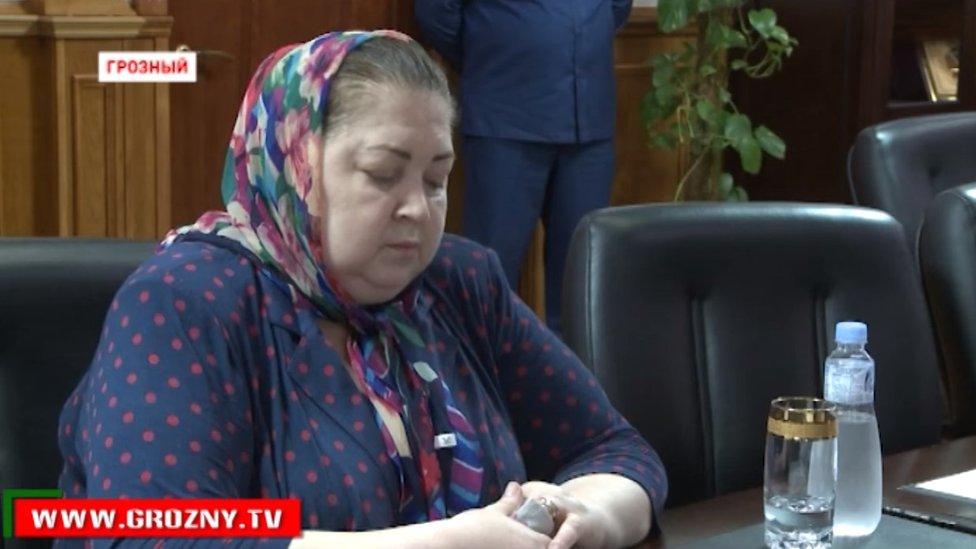
Yakha Beksultanova appears on Grozny TV to apologise spreading for false information

One day in May last year, Yakha Beksultanova swiped open her phone, tapped the Instagram icon, and began typing a message to the leader of Chechnya.
Days earlier, a fire had torn through Ms Beksultanova's apartment building in the Chechen capital of Grozny. Local reports said the blaze had left at least two residents with severe burns and dozens more homeless.
In all likelihood, Ms Beksultanova assumed her plea to the Chechen leader Ramzan Kadyrov would go unnoticed - his Instagram account, since shut down by the platform, had about three million followers and attracted hundreds of comments. But she typed out her message anyway and hit send.
"Dear Ramzan Akhmatovich, a big request: hear our pain and help render medical assistance to the victims. There are two of them: a mother and a son. In the photo, the mother - with more than 90% of burns and the son with more than 60%."
The message did not go unnoticed. Just a few hours after she wrote it, Ms Beksultanova found herself on Chechen state TV. Looking chastened, she gave a statement: "I did not have any information and thought that nothing was being done to help people. Today, I saw that a lot of work was being done."
The correspondent of the news programme described Ms Beksultanova's Instagram comment as a lie which would aid Chechnya's enemies. The Chechen Health Minister, Elkhan Suleimanov, accused Ms Beksultanova of insulting President Kadyrov.
Ms Beksultanova, holding a handkerchief in her hand, sighed and said nothing. But the message was clear: if you complain in Chechnya, be prepared to apologise for it.
'You can apologise for anything'
Over the past decade, Mr Kadyrov has asserted an authoritarian grip on Chechnya, a Russian republic in the North Caucasus. Staunchly loyal to the Russian President Vladimir Putin, Mr Kadyrov has crushed the free press and stifled dissent. Among the tools he has used, according to human rights activists: threats, forced disappearances and, over the past few years or so, televised public shamings.

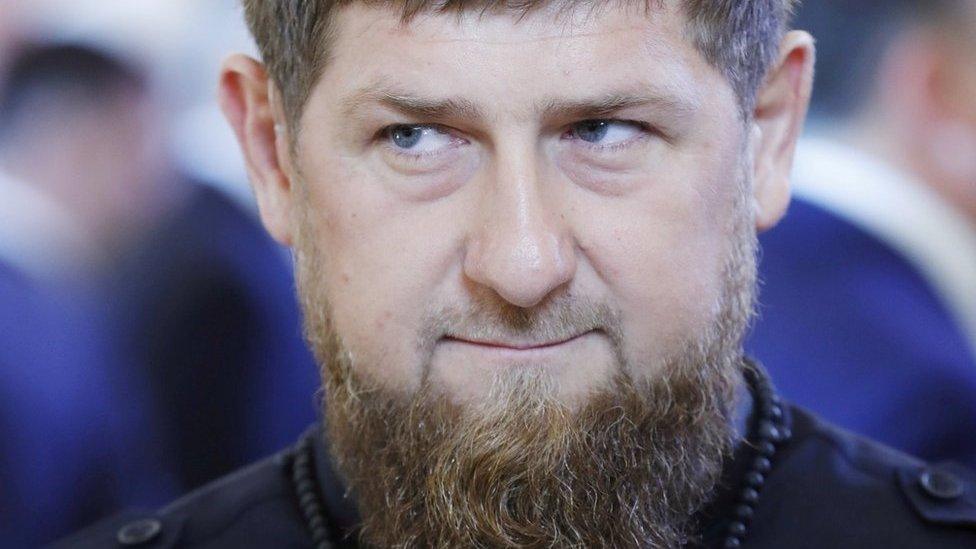
The head of the Chechen Republic, Ramzan Kadyrov, has been accused of brutally repressing his people

The tactic takes advantage of the deeply conservative nature of society in Chechnya. Like a modern-day stocks in the public square, it uses shame to keep people in line. Rights activists have traced examples of public humiliation back to the start of Mr Kadyrov's rule in the 2000s, when Chechen authorities used the principle of collective responsibility to crack down on the relatives of suspected separatist rebels, forcing them to apologise for and publicly disown family members.
The development of social media spawned a separate TV genre, in which citizens posting even mild dissent on social networks or private messaging apps were targeted.
One of the first well-documented examples was that of social worker Ayshat Inayeva. In late 2015, Ms Inayeva recorded a voice message on WhatsApp accusing Mr Kadyrov of neglecting poor Chechens while living lavishly. The message went unexpectedly viral and Ms Inayeva found herself on Grozny TV.

Below: Ayshat Inayeva in a Grozny TV broadcast, apologising to Ramzan Kadyrov
Allow YouTube content?
This article contains content provided by Google YouTube. We ask for your permission before anything is loaded, as they may be using cookies and other technologies. You may want to read Google’s cookie policy, external and privacy policy, external before accepting. To view this content choose ‘accept and continue’.

Unlike Ms Beksultanova, Ms Inayeva was brought before Mr Kadyrov himself. Sitting next to her husband on a golden-yellow sofa in front of the Chechen leader, his aides and her own boss, she looked visibly distressed. As Mr Kadyrov reprimanded her and played excerpts from her audio message, she recanted. She kept her head bowed throughout, moving only occasionally to wipe her nose with her headscarf.
Since then, Chechens have apologised on screen for a wide range of perceived offences, from spreading rumours about vaccines and child abductions, to complaints about local officials, to allegations of human rights abuses.
"If initially people apologised for remarks addressed to Mr Kadyrov or for criticising local authorities in general, now the apologies have transformed. You can actually apologise for anything," said journalist and human rights activist Aida Mirmaksumova from neighbouring Dagestan.
"For example, parents complain in a WhatsApp group that they are forced to collect money, forced to pay for a school trip to a circus or a theatre. Even for this they can be called to apologise."
'Her bad reputation is here to stay'
In March last year it was Maret Zanzulayeva's turn to say sorry.
Ms Zanzulayeva's offence was to accuse Chechen police of beating up people in her small village. She made the accusation at a local gathering and someone filmed the gathering and posted the video online.
Looking subdued and distressed, Ms Zanzulayeva sat quietly in front of the speaker of the Chechen parliament, Magomed Daudov, as he accused of her of having no respect for law enforcement.
"Maret, this case has sparked a lot of rumours in Chechnya… I have a question for you: has any representative of the authorities created any problems for you?" Daudov asked.
Ms Zanzulayeva looked down: "No," she said, adding: "I saw something I didn't really see."

Below: Ms Zanzulayeva apologises to the speaker of the Chechen parliament
Allow YouTube content?
This article contains content provided by Google YouTube. We ask for your permission before anything is loaded, as they may be using cookies and other technologies. You may want to read Google’s cookie policy, external and privacy policy, external before accepting. To view this content choose ‘accept and continue’.

Many of those hauled onto TV are reprimanded by officials and shamed by Grozny TV's correspondents, who warn them that their actions will damage their reputation.
In April, Kulsum Dzhavotkhanova, a nurse at a rehabilitation centre in the village of Alpatovo, was accused of provoking a patient into spreading false WhatsApp rumours about alleged abuse at the facility. In a six-minute report on Grozny TV, patients and officials said the allegations had been a lie and accused Ms Dzhavotkhanova of taking advantage of a patient.
Ms Dzhavotkhanova stood silently, her head bowed. Standing alongside her, her husband who apologised on her behalf. The segment ended with a closeup of Ms Dzhavotkhanova's face. "She is now out of work," the correspondent said, "but her bad reputation is here to stay."
No place to hide
In a disturbing trend, Chechens are being targeted not just for public expressions of dissent but for private messages sent to friends and family. Particular attention appears to be paid to audio messages on Whatsapp.
In September, Rovzat Dokudayeva from the small village of Dzhalka apologised on state TV for an audio message that she said she had sent only to her relatives, in which she warned about possible child abductors near a local school.
The message was forwarded on and eventually came to the attention of the authorities, and Ms Dokudayeva found herself on Grozny TV.
Chechens' activity on social media is monitored by a special department in charge of handling citizen's complaints. Officials from the unit appear to be working closely with journalists, who report positively on the reprimands carried on on citizens.
Igor Kalyapin, the head of the Committee Against Torture, a human rights group, said the Chechen state was developing a network of informants among its ordinary citizens.
"This never existed before," Mr Kalyapin said. "It has become fashionable to squeal. Many young people, seeing no real prospects, see it as a way to further their careers."
'I'd rather drink poison'
Those accused of spreading false rumours face an impossible choice. By apologising, they bring shame on themselves and their relatives. By refusing to do so they put themselves and their family at risk.
"A person can say: 'I'm not ready to be humiliated, let them do whatever they like with me,' but if this is about their children, brothers and sisters, or their parents, they do not have a choice," said Tanya Lokshina from Human Rights Watch in Moscow.
Collective responsibility had become "one of the most efficient repression mechanisms in Chechnya", she said.

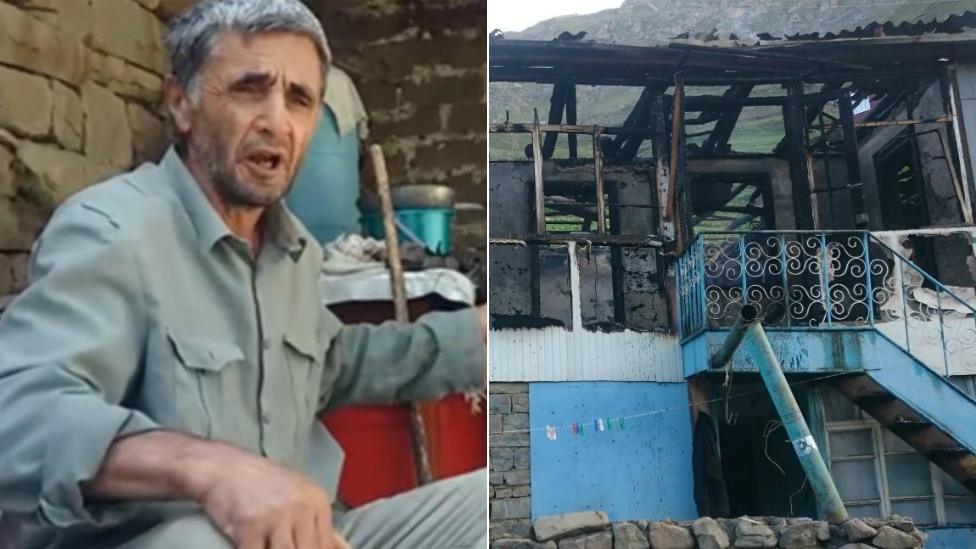
Ramazan Dzhalaldinov accused officials of embezzlement. His home was torched and he apologised.

In 2016, Ramazan Dzhalaldinov was forced to flee Chechnya after he accused local officials of embezzlement in an online video appeal to President Putin. His family home was torched, while Mr Dzhalaldinov himself was sentenced to community service for defamation and had to apologise on state TV.
Speaking to Russian journalists a year later, he said he had only apologised because his cousin was sent to prison after he released the video.
"They would not force me to do that again now. I'd rather drink poison than say those words again," he told Batenka Da Vy Transformer, an independent Russian media outlet.
In Chechen society, where personal and family dignity play a crucial role, being told to apologise puts people in a terrible bind. To refuse brings repercussions from the state; to agree brings shame.
"In effect, the disgrace falls not only on a person and their parents, but their entire family," said Aida Mirmaksumova, a journalist and human rights activist in neighbouring Dagestan.
"Nobody will have anything to do with your family or do business with them. A daughter will not be married into a family, a son-in-law will not be accepted. And on and on."


This story is part of a series by the BBC on disinformation and fake news - a global problem challenging the way we share information and perceive the world around us.
To see more stories and learn more about the series visit www.bbc.co.uk/beyondfakenews
- Published13 November 2018
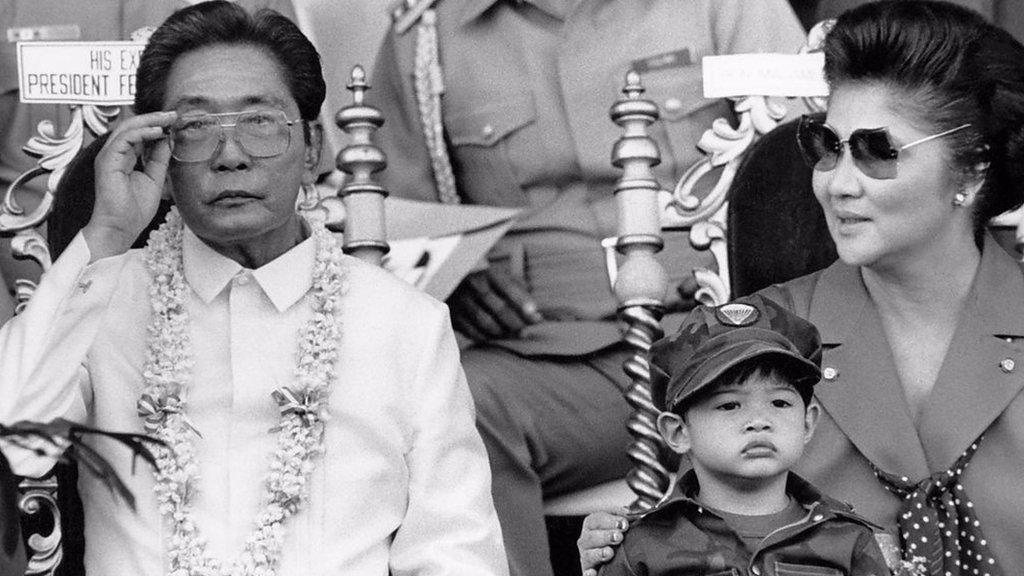
- Published12 November 2018
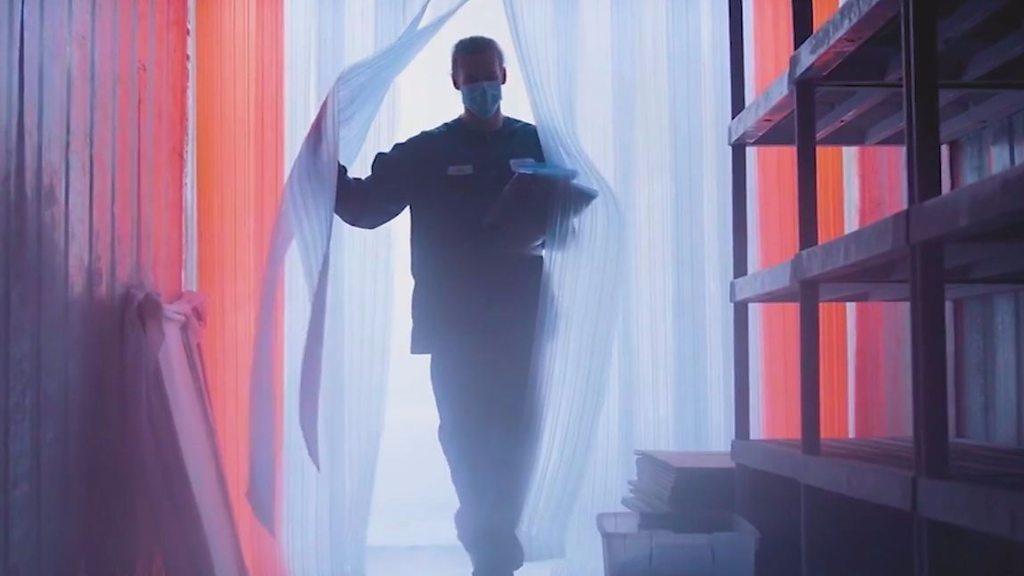
- Published12 November 2018
